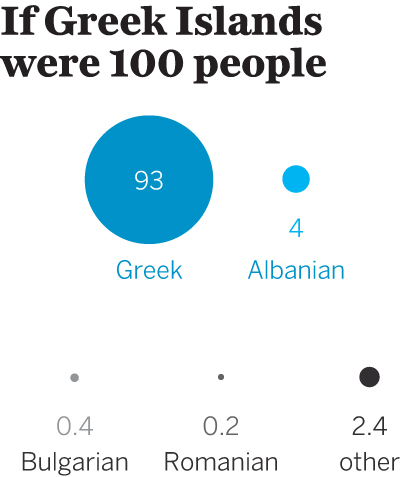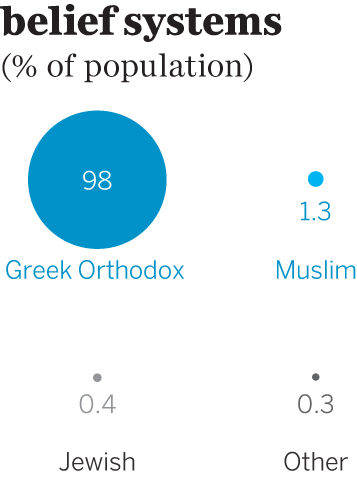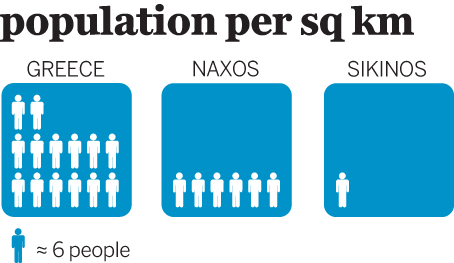Greek Islands Today
While life on the Greek islands seems to carry on relatively unfettered, few have been unaffected by savage wage and pension cuts, new taxes, record joblessness and thousands of closed shops and businesses, all brought on by the country's debt crisis. Tourism hasn't been the hoped-for miracle balm. Meanwhile, thousands of refugees who have landed on the islands in hope of reaching other parts of Europe are trapped in crowded island camps by closed borders, causing a humanitarian crisis that Greece is struggling to deal with.
Best on Film
Shirley Valentine (1989) Classic Greek-island romance on Mykonos.
300 (2006) Testosterone-fuelled retelling of the Spartans' epic stand against the Persian army in the 480 BC Battle of Thermopylae.
Mamma Mia (2008) The island of Skopelos shines to the soundtrack of ABBA.
Guns of Navarone (1961) Allied soldiers enter Nazi–occupied Greece in this compelling boy’s-own thriller.
Captain Corelli's Mandolin (2001) Lavish retelling of Louis de Bernières' WWII novel, awash with romance on occupied Kefallonia.
Best in Print
The Magus (John Fowles; 1966) Creepy mind games set on fictional island Phraxos.
The Odyssey (Homer; 8th century BC) Plagued by Poseidon, Odysseus struggles to return home to Ithaki.
Zorba the Greek (Nikos Kazantzakis; 1946) A spiritual bible to many; one man's unquenchable lust for life.
Something Will Happen, You'll See (Christos Ikonomou, 2016) Moving short stories of characters caught in the effects of the financial crisis.
Falling For Icarus: A Journey among the Cretans (Rory MacLean; 2004) A travel writer fulfils his ambition to build his own plane in the land of Icarus.
Colossus of Maroussi (Henry Miller; 1941) A travelogue of pre-war Greece, heralded as Miller’s best work.
Austerity Measures
The past decade has seen a widening of Greece’s stark economic and social disparities. The hedonistic lifestyles of Athenians taking weekend jaunts to Mykonos bear no resemblance to islanders struggling with severe wage drops, pensions cut by 40%, increased taxes and soaring living costs. This scene is the result of the enforced austerity measures attached to the multi-billion-euro bailouts loaned to Greece by its EU and IMF creditors in 2009, 2010, 2011 and again in 2015.
Growing anger and social unrest have sparked mass strikes, demonstrations and violent clashes with police in Athens that have spread to the larger islands. Disillusioned young Greeks are bearing the brunt of years of economic mismanagement – the country's most educated generation face bleak prospects as youth unemployment sits at 46%. There is a feeling of despair that is decidedly un-Greek.
Migration & Asylum
In 2015, the Greek islands’ refugee crisis came into focus when tragic images of a drowned three-year-old spread across world media. The young Syrian refugee had been headed to Kos with his family. Greece’s outlying islands have long been landing points for those in search of safety and a better life. Since 2015, 1.3 million illegal migrants have crossed into Greece; most come from Afghanistan, Iraq, Syria and Africa via the porous Turkish border, and many hope to reunite with family elsewhere in Europe.
In 2016, all European borders with Greece were closed in an attempt to discourage immigrants to the islands. In exchange, the EU committed to giving Turkey €6 billion to deal with their own refugee crisis. The numbers of refugees reaching the islands dropped drastically; some islands that saw up to 5000 arrivals daily in 2015 saw as few as 100 a day in 2017. Consequently, the number of drownings in the dangerous crossing has also declined.
Nevertheless, many NGOs and humanitarian groups believe the deal has actually increased human suffering. To date, fewer than 1000 refugees have been returned to Turkey. For many refugees who fled persecution and risked perilous boat journeys to reach Greece, Turkey is not considered a safe option. The alternative is to be trapped in Greece where, in June 2017, 62,000 refugees waited to be processed. More than 14,000 of these are on the southeastern islands, and more than half of them are women and children, many unaccompanied. Conditions in overflowing island camps have deteriorated drastically, with widespread crime and abuse. Increased trauma and depression have also brought a rise in suicide attempts. Many refugees have been trapped for more than a year and have run out of both money and hope.
European press coverage led to a slight decline in island tourism in 2016, despite little evidence that refugees had any impact on tourists. Within Greece, economic decline has fuelled xenophobia, sparking anti-immigrant rallies and growing hostility, yet deep-rooted island hospitality has reared its noble head, with many Greeks independently offering food and clothing to immigrants and local doctors volunteering to care for them.
Brain Drain
The islands' once-shrinking villages are welcoming a new wave of nouveau-poor Greeks. Families of out-of-work professionals and tradesmen, along with unemployed university graduates, are returning to ancestral homes on the islands and to help with family businesses – often in tourism or farming. An increase in agricultural employment is one of the by-products of the times, going back to Greece’s traditional strength and way of life (though agriculture now accounts for only 3.5% of the GDP). An increasing number of educated under-30-year-olds are also migrating to other parts of Europe, America and Australia in hope of finding employment.
On many of the islands, problems are exacerbated by fragmented infrastructures, seasonal isolation and foreign investment that hikes up property prices. Creating jobs for young people, particularly now that Athens is no longer seen as the promised land, is a major struggle.
Environmental Concerns
Climate change, diminished water supplies and rising sea levels are all very real concerns to islanders. Greeks generally are becoming increasingly aware of environmental degradation. On many islands you’ll find student groups, environmental charities and locals teamed up with expats working to protect the environment, though the debate is often tangled in the mixed interests of locals versus developers or back-door deals with local government.
Population
10.9 million
Life expectancy
80.5 years
GDP
€175 billion (US$195 billion)
Percentage of women
50.5%
Unemployment
24.6%


